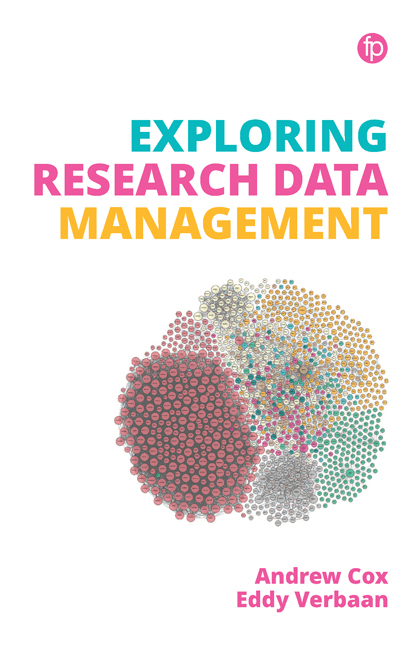Book contents
- Frontmatter
- Contents
- List of tables and figures
- 1 Introducing Research Data Management
- 2 The Social Worlds of Research
- 3 What Are Research Data?
- 4 Case Study of RDM in an Environmental Engineering Science Project
- 5 RDM: Drivers and Barriers
- 6 RDM as a Wicked Challenge
- 7 Research Data Services
- 8 Staffing a Research Data Service
- 9 Requirements Gathering for a Research Data Service
- 10 Institutional Policy and the Business Case for Research Data Services
- 11 Support and Advice for RDM
- 12 Practical Data Management
- 13 Data Management Planning
- 14 Advocacy for Data Management and Sharing
- 15 Training Researchers and Data Literacy
- 16 Infrastructure for Research Data Storage and Preservation
- 17 Evaluation of RDS
- 18 Ethics and Research Data Services
- 19 A Day in the Life Working in an RDS
- 20 Conclusion: the Skills and Mindset to Succeed in RDM
- Index
14 - Advocacy for Data Management and Sharing
Published online by Cambridge University Press: 21 September 2019
- Frontmatter
- Contents
- List of tables and figures
- 1 Introducing Research Data Management
- 2 The Social Worlds of Research
- 3 What Are Research Data?
- 4 Case Study of RDM in an Environmental Engineering Science Project
- 5 RDM: Drivers and Barriers
- 6 RDM as a Wicked Challenge
- 7 Research Data Services
- 8 Staffing a Research Data Service
- 9 Requirements Gathering for a Research Data Service
- 10 Institutional Policy and the Business Case for Research Data Services
- 11 Support and Advice for RDM
- 12 Practical Data Management
- 13 Data Management Planning
- 14 Advocacy for Data Management and Sharing
- 15 Training Researchers and Data Literacy
- 16 Infrastructure for Research Data Storage and Preservation
- 17 Evaluation of RDS
- 18 Ethics and Research Data Services
- 19 A Day in the Life Working in an RDS
- 20 Conclusion: the Skills and Mindset to Succeed in RDM
- Index
Summary
Aims
The aim of this chapter is to prompt you to think about strategies to influence researchers to see the importance of RDM to themselves.
Introduction
Many international and national bodies governing research have expressed their commitment to the ideal of open data. For all the qualifications, this is the ideal put forward by the UK Concordat on Open Research Data discussed in Chapter 5, for example. Yet data could be shared in a number of ways, many of which may be more familiar to researchers than open unrestricted sharing in a data repository, for example:
• with collaborators in a research group
• with collaborators beyond the institution in a particular project
• by request with peers
• within a particular community of researchers
• as supplementary information or otherwise linked to a publication.
There are some compelling reasons why most research data could be potentially shared in these different ways and much of it openly. This section considers some of those reasons.
You will recall from Chapter 4 that the soil scientist professor Steve Banwart said a lot about sharing within a specific project. Other RDMRose interviewees talked about data sharing:
Richard Rowe is a senior lecturer in the Department of Psychology at the University of Sheffield.
As a researcher, in some ways, it feels a bit strange to collect data and then just have anyone analyse it, but I think, as far as I understand it, there's ample time to do the analyses that you promised to do before everyone else gets hold of it. And as I say, a lot of the data that I work with is publicly available, so that's sort of always there for anybody to look at. That causes some problems in that you can end up with the same people doing the same work and duplicating efforts. The worst case of this I know of is one that I was involved in. [He describes the setting up of a project to reanalyse an existing dataset]. Then three weeks before we started, we just happened to turn on the news and see that someone had reported and done exactly the same analyses, and it was on the news, with exactly the same dataset.
- Type
- Chapter
- Information
- Exploring Research Data Management , pp. 125 - 138Publisher: FacetPrint publication year: 2018

